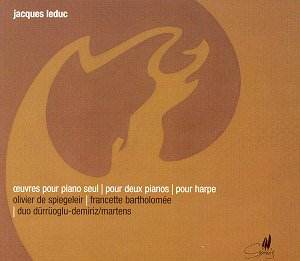For
all his academic appointments (he taught at the Royal Conservatory
in Brussels and still is Rector of the Chapelle Musicale Reine
Elizabeth and Chairman of the SABAM, the Belgian Copyright Society),
Jacques Leduc nevertheless managed to compose a sizeable output
in which piano and chamber music are prominent. He, however, also
composed, among other, a substantial Symphony Op.29
(available on CYPRES CYP 7601), a Oboe Concertino Op.10
(available on PHAEDRA 92029 recently reviewed here) and a Piano
Concerto Op.31 (available many years ago on an old LP
EMI 1A063-23990 nla) commissioned for the Finals of the 1972 Queen
Elizabeth Competition (a new recording of this magnificent work
is long overdue). I already briefly commented on Leducís music
when reviewing recent recordings of his Flute Sonata Op.21
(on CYPRES CYP 4615) and of his Oboe Concertino Op.10
(on PHAEDRA 92029). His varied output for piano, ranging from
short didactic pieces such as Six pièces faciles
Op.53, Scherzino Op.72, Fileuse Op.55
and Contrastes Op.24 to more complex works such
as the Fantaisie sur un thème de Mozart Op.73,
Apostrophes Op.35 and Prélude, variations
et fugato Op.19, is characterised by the very same qualities
that we have come to regard as Leduc hallmarks : clarity, subtle
harmony, refined elegance and formal mastery. Leducís models are
Debussy, Ravel, Roussel, Stravinsky and Bartók as well
as Mozart and Scarlatti. Two of Leducís piano pieces pay overt
homage to the latter.
In
spite of its somewhat diminutive title, Fantaisie sur un
thème de Mozart Op.73, written in 1990 at the request
of the Belgian pianist Jacques Genty who wanted a piece he could
play along with Mozartís own C Minor Sonata KV 457,
is a substantial work based on Mozartís basic cell for his KV
457, varied and developed in a remarkably resourceful manner.
On the other hand, Hommage à Debussy Op.46
is a suite of five short character sketches , all evoking the
French masterís music without ever attempting at slavish imitation.
Similarly, Quelques danses anciennes Op.36 may be
considered as Leducís homage to Ravel and his Tombeau de
Couperin. Exercices en forme de sonate pour célébrer
Scarlatti Op.69, another piece composed at the request
of Jacques Genty, are also clearly inspired by their model, though
again in Leducís personal way.
Quatre
miniatures Op.67, though overtly didactic in intent, are
as beautifully crafted as any other work by Leduc. In this as
well as in Six pièces faciles Op.53, Quatre
pièces brèves Op.18 and Pochades Op.58,
Leduc also lets some slightly ironic humour slip into his music,
e.g. in the last of Quatre miniatures (Escapade),
the Scherzetto of Six pièces faciles,
the final Ritmico of Quatre pièces brèves
or the whole of Pochades. Humour, however, may also
sometimes surface in more serious works such as the magnificent
Prélude, variations et fugato Op.19, his
longest and most substantial piano work so far. For all the serious
intent of the work, the variation section includes a Tempo
di valza, a Marcia burlesca and ends with another light-footed
Scherzino leading into the brilliant final Fugato.
Apostrophes Op.35 is a somewhat different proposition.
The music is much tenser with much angular writing and harsh rhythms,
rather redolent of Bartók and Stravinsky, and harmonically
more stringent. A short, concise, eventful piece, full of energy
and tension, though never recklessly so.
Scherzino
Op.72, Contrastes Op.24 and Fileuse
Op.55 were all written as test pieces for various competitions,
though they are in no way written down. All three challenge the
playersí abilities, but Ė again Ė never extravagantly so. Simpler,
fairly straightforward miniatures of great charm, ultimately very
rewarding. Fileuse Op.55, true to its title, is
a beautiful study in fluid piano playing whereas both other pieces
are more varied and contrasted, thus somewhat more demanding on
the players.
This
generous release also includes Leducís only works for two pianos
and for diatonic harp. Trois impromptus Op.16 for
diatonic harp were actually written before any of the piano works.
This superbly crafted piece is beautifully written for the instrument.
The central movement Poetico is particularly beautiful.
Impressions Op.51 for two pianos is another magnificent
triptych much in the same vein as Apostrophes. The
music, again, rather harks back to Bartok and Stravinsky than
to Leducís French models. I wish he could write more for this
medium.
Several
years ago, Olivier De Spiegeleir recorded some of these pieces
in a disc of Leducís piano music which he shared with Jacques
Genty (DUCHESNE CD 71662). He obviously has a great love and a
deep understanding of the music which he responds to with immaculate
and sensitive playing. The Duo Dürrüoglu Demiriz-Martens
do a fine job of Impressions as does Francette Bartholomée
of Trois impromptus. This generous programme is
superbly recorded and produced throughout.
If
you respond to the music of the composers mentioned in this review
or if you are a fan of Leduc, you will need no further recommendation.
Others, I may assure you, will find much to enjoy. Anyway, this
release is most welcome, the more so that such a tribute to Jacques
Leducís impeccable craftsmanship was long overdue.
Hubert
Culot
